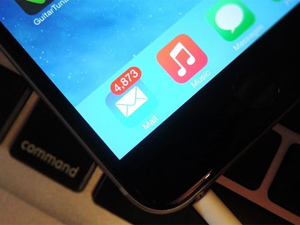



Date:03/10/17
 Smartphones were meant to make life easier, but a new study suggests that one third of notifications which pop up cause a downturn in our mood.
Smartphones were meant to make life easier, but a new study suggests that one third of notifications which pop up cause a downturn in our mood.
A team at Nottingham Trent University investigated the effect on mood as 50 participants received thousands of digital alerts over a five-week period.
Out of more than half a million notifications, they found that 32 per cent resulted in negative emotions, triggering users to feel hostile, upset, nervous, afraid or ashamed.
Notifications relating to non-human activity – such as general phone updates and wifi availability – had the worst impact on phone users’ mood, the researchers found.
Work-related notifications also had a negative impact on mood, particularly when they arrived in bulk.
However, in contrast, people enjoyed messages from friends, particularly several at once, which created a sense of belonging and feelings of connection to a social group.
“These digital alerts continuously disrupt our activities through instant calls for attention,” said researcher Dr Eiman Kanjo.
“While notifications enhance the convenience of our life, we need to better-understand the impact their obsessive use has on our well-being.
“It is clear that social notifications make people happy, but when they receive lots of work-related and or non-human notifications, the opposite effect occurs.”
As part of the study, the researchers developed an app – NotiMind – which participants downloaded to their phones. The app collected details relating to the phone’s digital notifications, as well as participants’ self-reported moods at various points in the day over a five-week period.
The researchers say their findings show that it possible to predict phone users’ moods based on information they are receiving. In the future they say it could be used to personalise notifications, so fewer system notifications were sent when someone was feeling down, or more entertainment features to boost mood.
Researcher Dr Daria Kuss, a psychologist in Nottingham Trent University’s International Gaming Research Unit, added: “Although notifications serve an important purpose for smartphone users, the number of apps which compete for attention has grown significantly over the years.
People often respond quickly, if not immediately to notifications, making them particularly disruptive. “Our findings could open the door to a wide range of applications in relation to emotion awareness on social and mobile communication.”
One third of smartphone notifications make our mood worse, research shows
 Smartphones were meant to make life easier, but a new study suggests that one third of notifications which pop up cause a downturn in our mood.
Smartphones were meant to make life easier, but a new study suggests that one third of notifications which pop up cause a downturn in our mood.A team at Nottingham Trent University investigated the effect on mood as 50 participants received thousands of digital alerts over a five-week period.
Out of more than half a million notifications, they found that 32 per cent resulted in negative emotions, triggering users to feel hostile, upset, nervous, afraid or ashamed.
Notifications relating to non-human activity – such as general phone updates and wifi availability – had the worst impact on phone users’ mood, the researchers found.
Work-related notifications also had a negative impact on mood, particularly when they arrived in bulk.
However, in contrast, people enjoyed messages from friends, particularly several at once, which created a sense of belonging and feelings of connection to a social group.
“These digital alerts continuously disrupt our activities through instant calls for attention,” said researcher Dr Eiman Kanjo.
“While notifications enhance the convenience of our life, we need to better-understand the impact their obsessive use has on our well-being.
“It is clear that social notifications make people happy, but when they receive lots of work-related and or non-human notifications, the opposite effect occurs.”
As part of the study, the researchers developed an app – NotiMind – which participants downloaded to their phones. The app collected details relating to the phone’s digital notifications, as well as participants’ self-reported moods at various points in the day over a five-week period.
The researchers say their findings show that it possible to predict phone users’ moods based on information they are receiving. In the future they say it could be used to personalise notifications, so fewer system notifications were sent when someone was feeling down, or more entertainment features to boost mood.
Researcher Dr Daria Kuss, a psychologist in Nottingham Trent University’s International Gaming Research Unit, added: “Although notifications serve an important purpose for smartphone users, the number of apps which compete for attention has grown significantly over the years.
People often respond quickly, if not immediately to notifications, making them particularly disruptive. “Our findings could open the door to a wide range of applications in relation to emotion awareness on social and mobile communication.”
Views: 359
©ictnews.az. All rights reserved.Similar news
- Azerbaijani project to monitor disease via mobile phones
- Innovative educational system to be improved under presidential decree
- NTRC prolongs license of two TV and radio organizations for 6 years
- Azerbaijan establishes e-registry for medicines
- Azerbaijani museum introduces e-guide
- Nar Mobile opens “Nar Dunyasi” sales and service center in Siyazan city
- International conference on custom electronic services held in Baku
- OIC secretary general to attend COMSTECH meeting in Baku
- Azerbaijan develops earthquake warning system
- New law to regulate transition to digital broadcasting in Azerbaijan
- Azerbaijani State Social Protection Fund introduces electronic digital signature
- Intellectual traffic management system in Baku to be commissioned in December
- Tax Ministry of Azerbaijan started receiving video-addresses
- World Bank recommends Azerbaijan to speed up e-service introduction in real estate
- Azerbaijan to shift to electronic registration of real estate





















